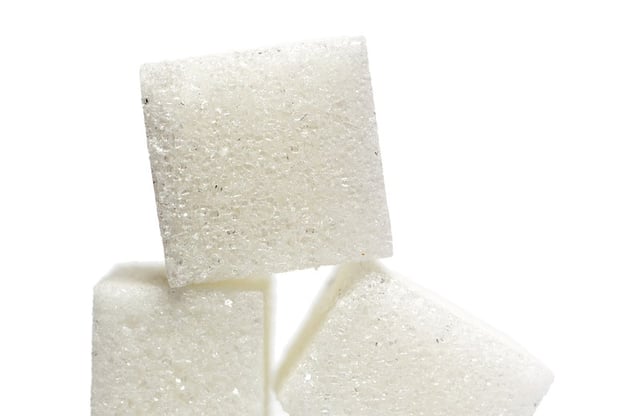
Maintaining excellent oral health involves a combination of developing good habits while eliminating some of our shortcomings. The good habits are ones we all probably know by heart:
- Brush twice a day for 2 minutes each time
- Floss once a day
- See your dentist twice a year
But did you know you may have some bad habits that are harming your healthy mouth, and maybe even undoing some of the progress you’ve made?
Here’s a look at 7 bad oral health habits and tips for breaking them.
1. Grazing or sipping on sugary snacks
While we know sugary treats aren’t the best thing for our teeth, many people don’t consider the fact that how we consume them has an impact on just how harmful they are.
The reason sugar is bad for your teeth is that it serves as the ultimate food for hordes of tiny bacteria that live in your mouth. As they feast on the sugar, they create an acidic byproduct that breaks down tooth enamel.
Now, if you were to eat a chocolate bar in a few minutes, then rinse your mouth and brush (but not too soon - See the next tip!) the damage would be minimal. But, if you decided to nibble a tiny bite of that same chocolate bar every ten minutes or so, making it last several hours, you’re exposing your teeth to more of that damaging acid over a longer period, doing far more damage. If you must have a sugary treat, make it small and finish it quickly.
The same applies to sugary drinks like soda and sweet iced tea. If you don’t want to finish it quickly, use a straw and position the straw towards the back of your mouth to limit its exposure to your teeth.
2. Brushing too soon after a sugary treat
On the surface, it seems to make sense that if you’re going to eat a sugary snack, the smart thing to do is brush your teeth afterward. But, if you do it too soon, brushing can actually make the problem worse. Acid from sugary drinks and candy tends to soften and weaken the enamel. If you then brush your teeth while the enamel is in that soft and weak condition, it’s like taking sandpaper to the hard outer layer of your teeth. The better option is to rinse your mouth out well with clean water immediately after a sugary snack, then wait at least 30 minutes before brushing.
3. Using your teeth as scissors, pliers, or any other tool
"This kind of abuse can lead to painful chips, fractures, or even tooth loss."
Convenience trumps thought more often than it should, which is why we tend to do silly things sometimes like clamp our pearly whites down on a jammed pen cap or use them to tear the tag holder off a new garment.
Although a healthy set of natural teeth are pretty resilient and may technically be up to the task, this kind of abuse can lead to painful chips, fractures, or even tooth loss. Instead, make it a point to use your teeth for chewing and nothing else. Be sure to have a pair of scissors, pliers, or whatever tool you actually need, handy wherever you are.
4. Biting your nails

Habits like nail biting can put pressure on teeth and increase the possibility of dental issues.
While the reasoning against biting your nails is essentially the same as what’s described above when using your teeth as tools, nail biting (and other biting or chewing habits) tends to have a different cause.
Usually, if you have a habit of biting your nails, chewing on pencils or pens, or gnawing the inside of your cheek, it’s a nervous habit. It could occur because you’re worried or anxious, or you’re dealing with a stressful situation.
Just like using your teeth as tools, nail biting and other nervous biting and chewing habits can cause damage to teeth and gums, and can even lead to chronic jaw pain in extreme cases.
Breaking this habit will usually require three different approaches:
- Have some legitimate substitute available to ease your need to bite or chew, such as sugar-free gum.
- Keep a stress ball or similar item nearby during stressful circumstances to keep your hands and fingers busy.
- Work on stress management tactics like breathing exercises or meditation to provide a healthier outlet for nervous energy and reduce your need to bite or chew at all.
5. Teeth grinding (bruxism)
If you find you involuntarily grind your teeth, either during the day or overnight, it’s important to see your dentist about it.
The jaw muscles are extremely strong and teeth are very hard. So, when you clench your jaws and rub your teeth together as a nervous habit, you can do a lot of damage fairly quickly.
Bruxism is a common problem, and it can usually be treated easily by a dentist who can prescribe a specially fitted mouth guard that will protect your teeth while remaining comfortable enough to use while you sleep.
The same kinds of stress management techniques described above to stop nail biting could be beneficial for teeth grinders also, especially if used just before going to sleep for the night.
6. Chewing hard objects
When you finish that cup of iced tea, do you have the urge to crunch down on a few ice cubes?
Just as noted above in other circumstances, your teeth are designed for chewing food. Nothing more, nothing less. Chewing on ice, popcorn kernels, and other hard objects can lead to chips, fractures, and tooth loss, which is otherwise avoidable.
Again, sugar-free gum is a much better option if you must chew on something.
7. Smoking
Smoking can be a very difficult habit to break, but curbing this habit is extremely important. Along with all of the health and lifestyle benefits that come with quitting, your oral health can vastly improve as well.
Smoking stains teeth, causes chronic bad breath, and is the leading preventable cause of mouth and throat cancers. The good news is, from the moment you finish your last cigarette, your body begins repairing the damage done and you should be able to see and feel positive benefits, including your smile.
If you’re putting the effort into maintaining good oral health - both by forming and keeping up with the good habits, and by working to break the bad habits - you should know you can save on dental care too. Find out how dental discounts can help you save up to 50% off dental care for less than $10 a month.
